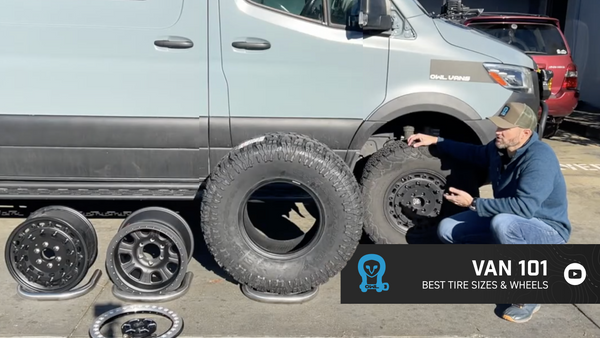Van 101
A Beginner’s Guide to Sprinter Van Tires, Wheels, Offsets, and Spacers
When it comes to building a van ready to handle any terrain, few upgrades make a bigger impact than your choice of wheels and tires. Whether you’re prepping for an overland adventure or optimizing your daily driver, every detail matters—diameters, load ratings, offsets, and the all-important question: What fits my Sprinter?
Understanding Tire Sizes: Metric vs. Standard
For Sprinter vans, the tire sizing world can seem like a maze. Here’s the breakdown:- Standard Sizing (e.g., 37x12.5R17): Refers to overall diameter x width in inches, with R representing the rim size in inches. Example: “37” is 37" tall, “12.5” is 12.5" wide, and “R17” fits a 17" rim.
- Metric Sizing (e.g., 275/70R17): Widely used for Sprinters. “275” is the tread width in millimeters, “70” means the tire’s sidewall height is 70% of the tread width, and “R17” is the rim diameter in inches.
Quick Reference Example:
-
275/70R17:
- 275mm wide tread
- Sidewall is 70% of 275mm (approx. 192.5mm)
- Fits a 17" rim
Load Ratings: Don’t Skimp on Strength
Sprinter vans aren’t light—especially after you add gear, water, and adventure mods. Each tire’s load rating is critical:- Look for Load Range D or higher. These tires can handle up to 3,525 lbs (1600 kg) per tire, which is plenty of coverage for a loaded sprinter.
- Always leave a margin: If your van weighs 10,000 lbs fully loaded, expect each tire to carry ~2,500 lbs.
Sizing Up: What’s the Biggest Tire That Fits My Sprinter?
This is the question we hear most. Here’s the reality:
- Chassis matters: VS30 (2019+) vans have smaller wheel arches than older NCV3 vans.
- Sensor Limitations: 275/70R17 is the largest practical size for a 4WD VS30 Sprinter while retaining full function of features like adaptive cruise and collision avoidance.
- Go bigger? Yes—but expect serious trimming. Tires up to 35" require cutting/drill work (fender trimming, mud guard relocation, etc.) and may disable safety features due to electronic speed mismatches.
Tread Patterns: Choose for Your Adventure
Your tread matters just as much as size. If your van sees off-pavement action, look for tires with sidewall tread—when aired down, you'll gain a wider contact patch and more bite over obstacles.
- Street/Highway Tread: Closely spaced, low-profile lugs. Great for quiet performance and long life on pavement.
- All-Terrain (A/T): Versatile. Blocky lugs and moderate spacing for mixed on/off-road.
- Mud-Terrain (M/T): Widely spaced, aggressive tread for maximum off-road grip, mud, and rock. Sidewall lugs help when aired down off-road.
Airing Down for Off-Road: Why Sidewall & Wheel Size Matter
Big wheels might look cool, but function matters. A plush sidewall also protects your wheels from trail hazards and gives you the ability to ‘air down’ for tough tracks.- Larger rim = smaller sidewall—bad news for traction.
-
Prefer a 17" rim (not 18", 19", or 20"); it leaves ample sidewall for flex, cushion, and grip when running low pressures off-road.
Wheel Types: Regular vs. Beadlock
- Regular Rim: Secures tire bead with rim flange; safe for daily use, easy to service.
- Beadlock: Physically clamps the tire bead, locking it between a steel or alloy ring and the wheel. Lets you run very low PSI off-road without fear of unseating (“popping the bead”)
Offset, Backspacing & Spacers: Perfecting Your Stance
- Offset: Distance from wheel’s hub mounting surface to centerline. More negative offset = wheels stick out (wider stance, more track width).
- Backspacing: Measured from back rim edge to hub mounting surface.
-
Why It Matters:
- A wider stance lowers your center of gravity and stability off-road.
- Limits for Sprinters: Don’t go too wide—you’ll hinder sliding door operation and risk rubbing.
- Wheel Spacers: Safely change track width, but always use hub-centric spacers. Never rely on lug-centric (unsafe for heavy vans).
Lug Nuts, Bolts, and Changing Wheels
- Factory wheels: Dome-style lug bolts.
- Most aftermarket wheels: Cone-style lugs. Never mix and match—ensure the bolts you're using match wheel seat profile exactly.
Putting It All Together: Pro Recommendations
-
Tire: 275/70R17 All-Terrain (e.g., BFGoodrich KO2) is a proven performer for Sprinter 4WD vans—excellent on-road manners, solid off-road bite.
-
Wheel: 17" with appropriate offset for your van and tire combo. Check fitment for sliding doors and suspension travel.
-
Spacers: If needed to clear brakes or widen stance, use quality hub-centric spacers only.
-
Mud Guard Trimming: Expect to trim or relocate mudguards for anything taller than 32" tires.




